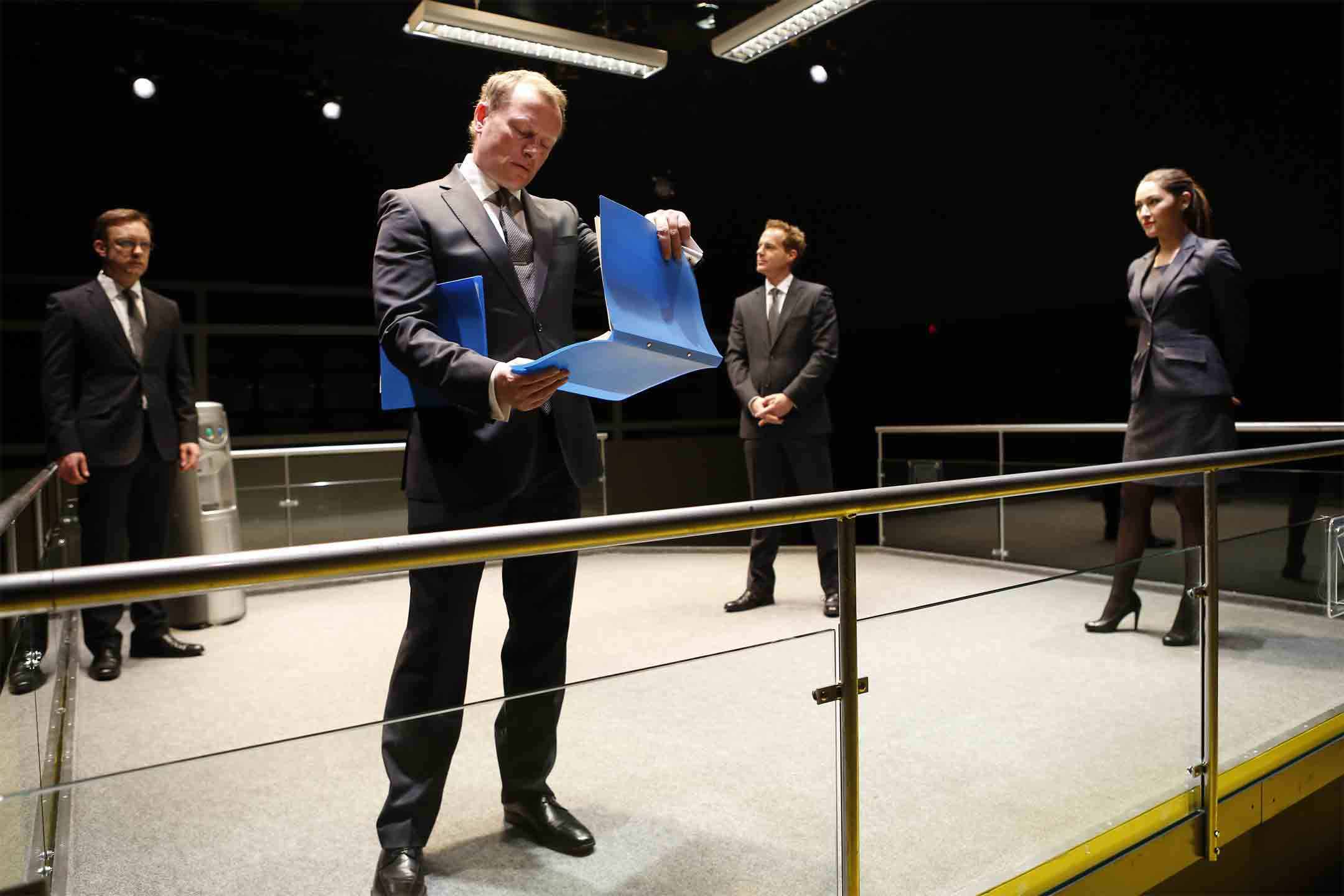SITE GUIDE
SEARCH
REVIEWS
REVIEW ARCHIVES
ADVERTISING AT CURTAINUP
FEATURES
NEWS
Etcetera and
Short Term Listings
LISTINGS
Broadway
Off-Broadway
NYC Restaurants
BOOKS and CDs
OTHER PLACES
Berkshires
London
California
New Jersey
DC
Philadelphia
Elsewhere
QUOTES
TKTS
PLAYWRIGHTS' ALBUMS
LETTERS TO EDITOR
FILM
LINKS
MISCELLANEOUS
Free Updates
Masthead
A CurtainUp Review
Bull
| "When it comes down to it we're people aren't we, all of us, every single one an we should be treated as human beings."— Carter
|

L-R: Sam Troughton, Neil Stuke, Adam James, and Eleanor Matsuura (Photo by Carol Rosegg)
|
From an aesthetic perspective it's easy to see the connection between the two. Both make use of unconventional stage designs: in Cock, a cock pit; in its successor, a boxing ring, reconfigured by Soutra Gilmour with a drab carpet and fluorescent overhead lighting to suggest an office space.
While the cock pit serves as an appropriate symbol for the battles within and without in Cock, Bull's staging is perhaps even more thematically apt. From the beginning it's clear this is a battle for survival. Thomas (Sam Troughton), Tony (Adam James), and Isobel (Eleanor Matsuura) arrive for a meeting with their employer with the understanding that one of them will get the axe.
Though he tries to go pound for pound with his colleagues, the bespectacled, defensive Thomas never stands much of a chance. And the truth is, he's never meant to have one. Like the bull in the ring to which to the play's title alludes, Thomas' fate is sealed. His demise is only a matter of time. What follows is an exercise in intimidation and degradation. The macho Tony and the domineering Isobel rip into Tomas straight away, paralyzing him with verbal feats of strength and coercing him into acts of physical humiliation. Slowly but surely, they strip away every last shred of his dignity, with no lack of mirth. And when their boss, Carter (Neil Stuke), arrives the blows only come more decisively.
As in its predecessor, Bull's unique physical arena allows for a complex ballet of movement. Under Allistair David's choreographic direction, Thomas always seems cornered in and his colleagues maneuver around him like calculating predators. And though the set is minimal, it's surprisingly dynamic. As the action intensifies, the lights subtly dim, and the creeping addition of ambient sound (incorporated beautifully by Christopher Shutt) is enough to change the ambience from bland to menacing, without being ostentatious.
"It's tough, isn't it, life," says Isobel, in perhaps the play's single biggest understatement. And indeed it is. Thomas' problems, it turns out, are deeper than those in the present action. And Isobel and Tony, though they have the upper hand, live equally bleak existences: Tony's, marked by superficiality and, Isobel's by trauma. Nobody really wins here.
Isobel's comment is the precursor to a brutal monologue, which Matsuura delivers with unforgiving precision. Thomas' concurrent breakdown is simultaneously horrifying and thrilling, due primarily to Troughton's virtuoso performance. He shakes, he quietly seethes, and when he explodes with an animal rage, there's no mistaking his commitment and his ability: Troughton is the real deal.
Bartlett's talent is for creating crisp dialogue and finely wrought characters. But Cock and Bull also distinguish him as a visionary with ideas about how the theater should be experienced. A third round would be welcome.
|
Bull Written by Mike Bartlett Directed by Clare Lizzimore Cast: Adam James (Tony), Eleanor Matsuura (Isobel), Neil Stuke (Carter), Sam Troughton (Thomas) Set Design: Soutra Gilmour Lighting Design: Peter Mumford Associate Lihting Design: Dale Knoth Sound Design: Christopher Shutt Production Manager: Dan Franklin AEA Stage Manager: Raynelle Wright Stage Manager: Sarah Gentle Choreographer: Alistair David Fight Director: Christian Thompson Assistant Director: Jonathan O'Boyle Wardrobe Supervisor: Emma Thompson Running Time: 55 minutes 59E59 Theaters, 59 East 59th Street, New York, NY 10022, www.59e59.org, (212) 691-5959 From 4/25/13, closing 46/2/13, opening 5/2/13 Performance times: Tue, Wed & Thu 7:15, Fri 8:15, Sat 2:15 & 8:15, Sun 3:15 & 7:15. Ticket cost: $30-$35 Reviewed by Jordan G. Teicher at 4/30/2013 performance. |
| REVIEW FEEDBACK Highlight one of the responses below and click "copy" or"CTRL+C"
Paste the highlighted text into the subject line (CTRL+ V): Feel free to add detailed comments in the body of the email. . .also the names and emails of any friends to whom you'd like us to forward a copy of this review. Visit Curtainup's Blog Annex For a feed to reviews and features as they are posted add http://curtainupnewlinks.blogspot.com to your reader Curtainup at Facebook . . . Curtainup at Twitter Subscribe to our FREE email updates: E-mail: esommer@curtainup.comesommer@curtainup.com put SUBSCRIBE CURTAINUP EMAIL UPDATE in the subject line and your full name and email address in the body of the message. If you can spare a minute, tell us how you came to CurtainUp and from what part of the country. |
©Copyright 2013, Elyse Sommer.
Information from this site may not be reproduced in print or online without specific permission from esommer@curtainup.com



 Anything Goes Cast Recording
Anything Goes Cast Recording Book of Mormon -CD
Book of Mormon -CD